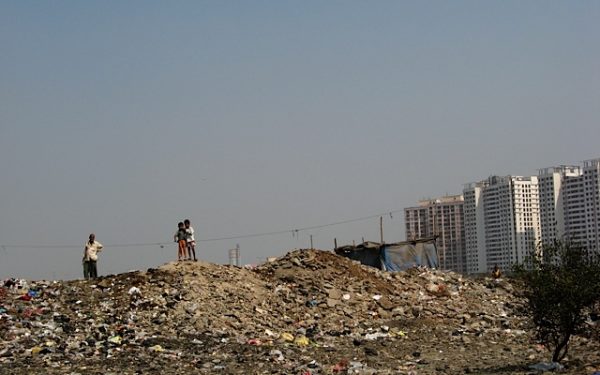Finding India’s Real Slumdogs
July 1, 2012
It is rare to come across a book as garlanded with praise as Behind the Beautiful Forevers. It is yet more rare to find one that deserves it. A page turner with a gripping human interest story, this is essential reading for anyone interested in the real India. It dives beneath official statistics and worthy rhetoric to show a corrupt third world society really works, and how it crushes the vulnerable.
It should be prescribed reading for everyone in the aid sector and anyone thinking of doing business in India.
Pulitzer Prize-winning journalist Katherine Boo spent nearly four years interviewing the inhabitants of Annawadi, a slum next to Mumbai’s new airport. Under the shadow of rising hotels, these people eke out an existence alongside pools of toxic effluent. Many depend on – and fight over — the thin opportunities offered by the rubbish tossed out from construction projects around the airport.
Boo’s book does not sentimentalize the poor, nor does it treat them as mere victims. Bracingly, it depicts them as capable of behaving just as cruelly as the authorities that make their lives a misery, and as ruthlessly as India’s new rich.
Boo’s cast of characters are mostly migrants to the city. They include a trio of teenage boys who hope their skills as sorters — or thieves – of trash will raise their families out of poverty, without bringing them into potentially fatal conflict with criminal gangs or the authorities. Then there is Asha, a mother who exploits the crooked machinery of government and the naivety of aid agencies to become the city’s first female slumlord.
But the person who sets a shattering tragedy in motion is Fatima, a cantankerous, highly-sexed schemer who plots to destroy the family in the hut next door. She does this by setting herself afire and telling the police that their hardworking son was responsible.
The book offers a more intimate understanding of slum life than an academic study ever could, and much richness besides. You encounter in Boo’s coolly restrained prose both the brutalizing effects of corruption, poverty and official malfeasance, and examples of amazing human resilience.
(One of the extraordinary things about “Forevers” is that Boo uses real names: even those of the political bosses who give Asha money for a non-existent school in return for supplying crowds for demonstrations. And Boo certainly does not spare the feelings or reputations of the impoverished people who talked to her – through interpreters – for so many hours.)
Her book is even more remarkable as an antidote to the recent celebratory bilge that has been written about shining India and the emergence of a huge “middle class”. It is the background Boo gives to her dispassionate narrative that is at least as shocking as the desperate measures taken by its protagonists. Boo matter-of-factly situates them in a world in which hospitals have no medicines because staff sell them on the black market, in which education programmes (some British-funded) are a joke on their supposed beneficiaries, and the police are thuggish extortionists whose services are rented to the highest bidder.
Thanks to her skillful storytelling, “Beautiful Forevers” races along like a novel, while packing the punch of a documentary. There are even times when you wonder if her subjects really could have said the dramatically perfect words she attributes to them. If some of her reportage can feel too good to be true, it is also arguably incomplete given that you never hear the versions of the corrupt officials, police or doctors.
There is also a passage in which Boo foolishly blames the slumdwellers’ plight on “global market capitalism”. If she had been to India before the opening of its economy in 1989, she would know that the slums were at least as grim, officialdom at least as corrupt – and life was in many ways even worse than it is today.
That said, there is no question that Boo has done a great service not only to the people of Annawadi and other slums, but also to all the readers who find their way to the Beautiful Forevers.
Behind the Beautiful Forevers: Life, Death and Hope in a Mumbai Slum by Katherine Boo; Portobello; 288pp; £14.99.
